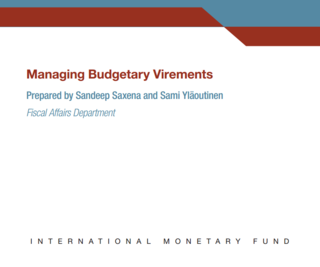

Posted by Sailendra Pattanayak and Sandeep Saxena[1]
The IMF published this week two new papers in its series of Technical Notes and Manuals (TNMs).
The first paper, by Sailendra Pattanayak, is on “Expenditure Control: Key Features, Stages, and Actors” (TNM/16/02).
Effective expenditure control is the sine qua non of good PFM. Fiscal rules, medium-term budget plans and annual budgets are meaningless if expenditure cannot be controlled during execution. A lack of control over government expenditure remains a problem in many countries. For example, the TNM points out that more than two-thirds of low and middle-income countries covered by PEFA assessments have weak systems of expenditure control that are also associated with higher level of payment arrears and a lack of budget credibility. Weak control not only threatens macroeconomic stability and fiscal discipline, but can also call into question the integrity of the PFM system and undermine trust in the government’s stewardship of public resources.
To help practitioners evaluate a country’s budget execution system and identify priorities for strengthening expenditure control, this TNM:
- Explains the seven key stages of government expenditure;
- Describes the types of control applied at each stage of the chain, their objectives and key features;
- Examines the influence of different administrative traditions (Anglophone, Francophone, etc.) on the types of control exercised, including the authority and responsibility of various institutional actors;
- Identifies typical weaknesses and problems associated with different models of expenditure control; and
- Discusses specific actions that governments may take to address these challenges.
The TNM, which also provides examples of expenditure control practices from more than 32 countries, will help governments and PFM practitioners to evaluate budget execution systems and identify priorities for strengthening them. It will also assist in guiding the modernization of treasury systems, including the design and implementation of IT-based financial management information systems.
The paper is available here.
The second paper, by Sandeep Saxena and Sami Yläoutinen, is on “Managing Budgetary Virements” (TNM/16/04).
Virements are useful as an instrument of budget flexibility, but excessive flexibility can lead to undesirable consequences. A delicate balance between flexibility and efficiency on one hand and accountability on the other needs to be maintained. But where should this line be drawn? Should executives have the authority to move approved budgets across ministries, programs, and economic categories? How should this authority be regulated? How much of this power should devolve on line ministries and how much should be centralized with ministries of finance?
The new TNM seeks to answer some of these questions. It defines virements (within-year transfers between budget lines), clarifies their purpose, specifies what general and country-specific considerations should go into designing a virement framework, and how the virement process could be made more efficient and transparent. Recognizing that there cannot be a one-size-fit-all approach, the TNM argues that countries need to design their virement policies keeping in view their budget flexibility and accountability needs, as well as their legal-cultural environment and the state of development of PFM. The note maps the landscape of existing country practices and uses examples from over 25 countries to illustrate the underlying concepts.
The authors hope that this TNM will help governments and PFM practitioners in designing and implementing sound virement rules and bring greater transparency and efficiency in budget management.
The paper is available here.
[1] Sailendra Pattanayak is a Senior Economist, and Sandeep Saxena a Senior Economist in the PFM Divisions of the Fiscal Affairs Department, IMF.
Note: The posts on the IMF PFM Blog should not be reported as representing the views of the IMF. The views expressed are those of the authors and do not necessarily represent those of the IMF or IMF policy.





